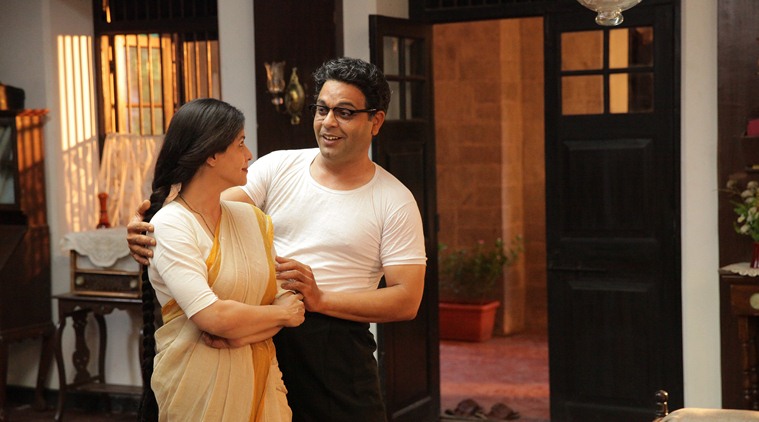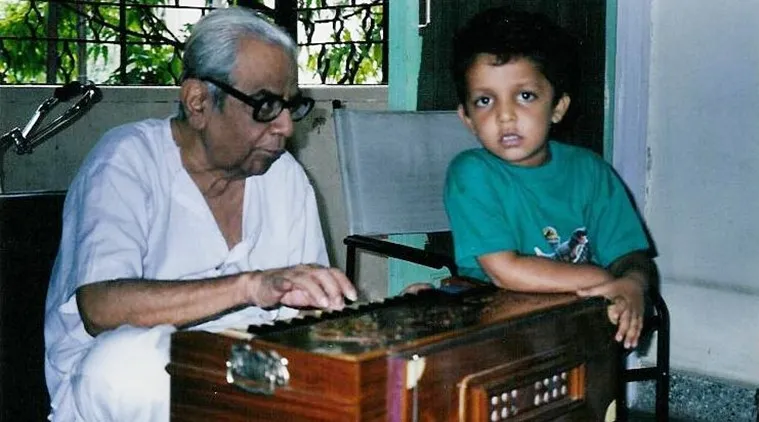
On the morning of December 17 in 2017, a break-in was reported at a locked flat in Malti Madhav Society in Pune. While nothing was stolen, many documents, letters, manuscripts and books were left scattered on the ground. A crime branch cop, who later cracked the case, joked that the burglars had not recognised the “jewels” they had left behind. That apartment was where Pu La Deshpande and his wife Sunitabai had spent their last days.
There is arguably no other person in Marathi arts and culture, who is more widely adored and respected than Purushottam Laxman Deshpande or Pu La to his loved ones. He was a writer, playwright, humorist, scriptwriter, composer, singer, actor and also a socially vocal and active philanthropist — and this list is still insufficient to describe who he was. As Maharashtra celebrates Pu La’s birth centenary this year, a two-part biopic on him, Bhai: Vyakti ki Valli, has sparked a fierce debate. Critics of the Mahesh Manjrekar film have been riled by what they call are factual errors, as well as a depiction of Pu La “in a bad light”, especially in scenes that showed him smoking and drinking. Some of the jokes that Pu La is seen cracking in the film, are, according to some, far from the kind of humour he was known for. “There is a difference between an artist taking creative liberty and distorting the facts. His satire was never a mockery of people and situations around him, which the film seems to be showing,” says writer and educator Mangala Godbole, biographer of both Pu La and Sunitabai. A piece carried in Loksatta in January raised questions on the portrayal of Pu La as well as his contemporaries like classical vocalists Bhimsen Joshi, Vasantrao Deshpande and Hirabai Barodekar. Subsequently, family members of Joshi and Barodekar, relatives of Pu La and Sunitabai came out in protest.
Manjrekar has defended his film, arguing that he was reaching for a more human portrayal of the icon. “I have made a film that I wanted to make, and not the film which many of the critics have in their heads. People have an option not to watch it but you do not have the option to tell me how to do it. The objection that he has been portrayed as a drunkard is rubbish. There is one scene where he has been shown drinking socially. It is also well-known that he smoked. There is a scene where Pu La and Sunitabai decide not to have a child. Doesn’t that scene show the human side of him, a different shade of his personality?”
In her autobiographical account Aahe Manohar Tari (Though Everything Seems Beautiful, 1990), Sunita too wrote about a lesser-known, human side of of Pu La with all his flaws and weaknesses. Manjrekar has maintained that this book was one of the key inspirations behind his film.
Born on November 8, 1919 in a small chawl in South Bombay, then a relatively sleepy place, Pu La took to singing, writing and acting from his school days. In an account of his childhood, he wrote, “My father worked as a clerk with a paper trader. He would have never imagined that his son would waste reams of paper in the name of writing.” Pu La went on to work as a school teacher and college lecturer, and even as a television journalist.

“I grew up in the era of Gandhi and Nehru. But there are only two people whom I can call my eternal inspirations,” he says in a documentary made by the Films Division on his 60th birthday, while pointing to portraits of Charlie Chaplin and Rabindranath Tagore. That was a love inherited from his family. His maternal grandfather, poet and writer Vaman Mangesh Dubhashi, had translated Gitanjali into Marathi.
The title of Manjrekar’s film is a hat-tip to one of Pu La’s most loved works, Vyakti ani Valli (1966), a collection of character sketches, which won him a Sahitya Akademi Award. While vyakti refers to an individual, valli is an eccentric person. Deshpande’s warm, human vision picked out and revelled in the imperfections of ordinary people. He not only laughed at himself, but also left readers with the wisdom to laugh at themselves.
While he brought out the hidden comedy in the everyday middle-class lives after Independence, his following was not limited to a particular class. Long before stand-up comics found a large audience, Deshpande’s one-man acts on stage such as Batatyachi Chawl (The Potato Chawl, stories from an imaginary Mumbai chawl) and Varyavarachi Varaat (A Procession on the Wind) — much like contemporary sets — took potshots at the delusions of society. In one of his books, the urban middle-class protagonist says, “Sometimes I feel this world is meaningless and feel like directly going from the office to Himalayas instead of coming home. But then I remember that the wife has prepared my favourite thalipeeth. I wrap up my thoughts of sanyaas and come back to life.”
Pu La was never associated with any ideology, but he was certainly not apolitical. He openly criticised all regimes, but also engaged with the thoughts of leaders from Mahatma Gandhi to Vinayak Damodar Savarkar. His writing was not restricted to humour, but also dealt with some of the important social, political and philosophical undercurrents of his times. In Ek Shoonya Mi (Me, a Zero), a collection of short essays published on his first death anniversary in 2001, Pu La reflects on the void that exists in all efforts to gain knowledge. “There is no escaping from questions…When I closely look at the symbol of the question mark — Eureka! — I see it has a zero at its bottom,” he writes, ever the intellectual in search of a truth as well as the realist who saw the futility of overarching answers.
What would Pu La, who looked at life and his times with mischievous humour, have made of the row? In the documentary, Pu La says, “If someday, people want to install a statue of me — god forbid that does not happen, because statues are where crows answer their nature’s calls — I will tell them to write just one thing on it — ‘This man made us laugh’.”
This article appeared in print with the headline ‘The Man Who Made Us Laugh’.